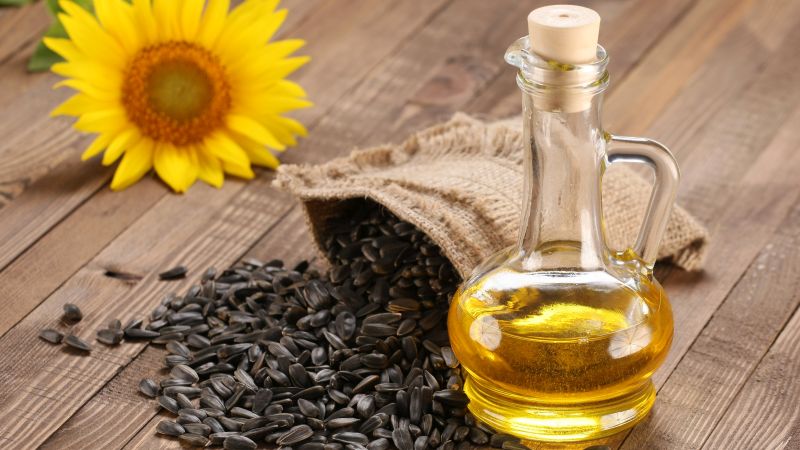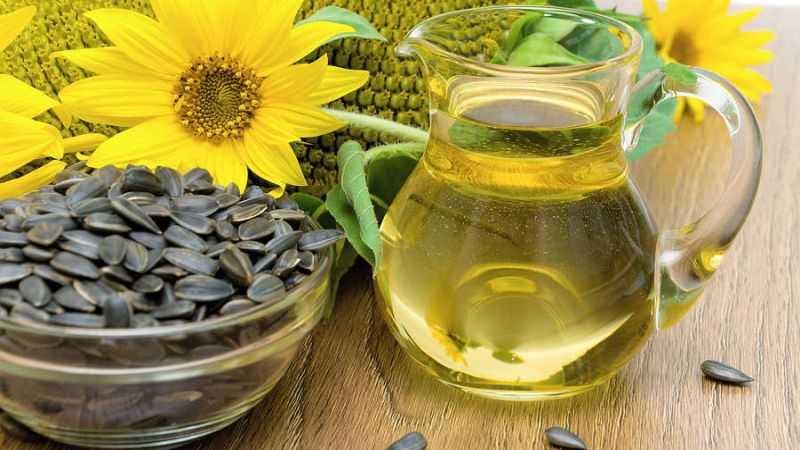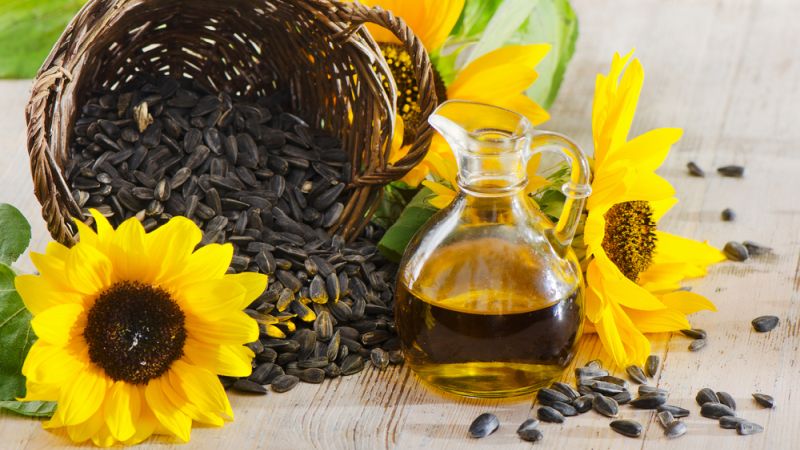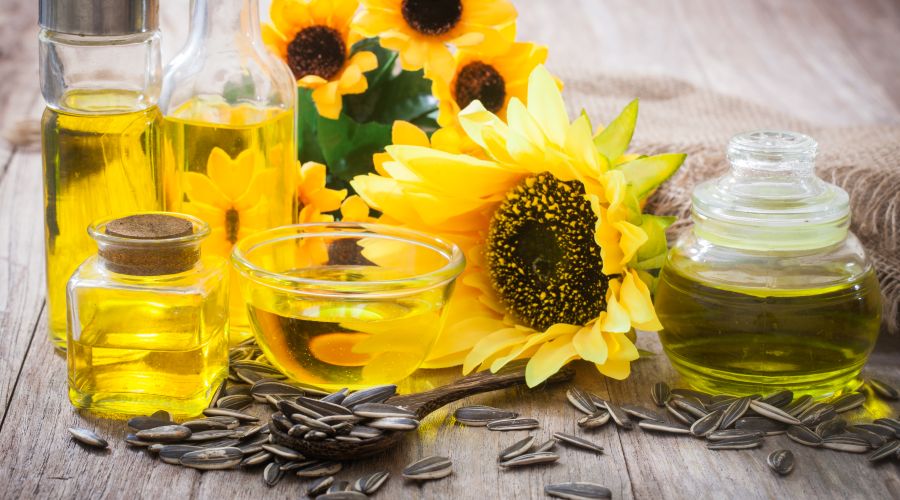Sunflower seed oil is packed with nutrients vital for healthy, strong hair and skin. Here’s everything you need to know to put it to use.
Table of contents:
What is sunflower oil?
Benefits of sunflower oil for skin and hair.
Uses of sunflower seed oil.
Best Forms of Sunflower Oil.
How to Use Sunflower Seed Oil for Skin.
Ok, ladies (and gents!). Prepare yourself for an epic facepalm moment. Today’s ingredient is one that you’ve probably seen a dozen times never realizing its true potential.
You may even have a family photo with a few of these peppered in the background, or perhaps you enjoy its seeds sprinkled on a salad or mixed in granola.
We’re talking about sunflowers, and if you’re anything like us, you’ve been underestimating its skin-boosting oil for far too long.
What is Sunflower Oil?
Sunflowers are best known for their huge, bright flowers as well as their delicious, snack-worthy seeds. Its oil is growing more popular in the kitchen as a healthier alternative to canola oil, but its most valuable use remains somewhat hidden.
While it may sound surprising, sunflower oil has been used medicinally for generations. First produced in Russia in the mid-1800s, it is now sourced mainly from Argentina and Ukraine but is used throughout the world.
From asthma to arthritis, sunflower oils have many properties that make it more than just a pretty face. Rich in fatty acids that work as antioxidants, it’s a powerful weapon in the fight against free radicals, protecting the body from aging and disease. For this reason, it’s an excellent addition to skin, face and hair care products.
Benefits of Sunflower Oil for Skin and Hair

Sunflower oil is naturally non-comedogenic, meaning it provides remarkable hydration and firming without clogging pores. In fact, it can even help prevent acne and breakouts. Rich in vitamin E, selenium, vitamin K and amino acids, it’s full of nutrients that the skin needs for optimal health.
A powerful antioxidant, vitamin E scavenges for free radicals that cause signs of aging like wrinkles and sagging skin. In the long term this will help you stay younger longer.
The omega-6 fatty acids in sunflower oils decreases inflammation and restores lipids in damaged skin. Research shows the fatty acids also keep your skin barrier healthy and reduce water loss. These benefits are very helpful for dealing with dermatitis.
The vitamin K keeps skin elastin healthy. Elastin is the protein that makes up the connective tissue in skin. This means sunflower oil improves wound healing and scar reduction.
It has been proven to be safe for skin, and even reduced infection in babies!
The benefits of sunflower oil for hair are equally impressive. When used in moderation, it doesn’t increase scalp oiliness and can keep hair silky and shiny without weighing them down. In fact, sunflower oil actually supports the health of sebaceous glands, keeping them from overproducing the sebum that creates an oily scalp.
Use Sunflower Seed Oil to Ease Asthma, Boost Immune System & More

While sunflower seed oil offers amazing topical benefits, it’s also useful internally. Because of the oil’s fatty acids, it’s a known anti-inflammatory agent, providing benefits for asthma sufferers as well as those dealing with arthritis.
The oil’s antioxidants provide immune system benefits while also decreasing the number of bacteria and viruses that penetrate the body’s mucous membranes.
When used in supplement form, sunflower oil benefits also include:
- Energy enhancement
- Colon cancer reduction
- Healthy blood pressure
- Heart disease and stroke prevention
- Infection prevention in newborns
- Cholesterol improvement
Best Forms of Sunflower Oil

As with most supplements and health foods, not all forms of sunflower oils are created equal.
The way in which sunflowers are grown, processed and packaged can impact the strength and nutritional content of the final product. Consider purchasing only plant-based options, which are produced without exposure to pesticides, herbicides and other dangerous chemicals.
If you’ve ever read the ingredient labels on the potato chip aisle, you’ve probably seen mid-oleic sunflower oil. While popular in processed foods, this form isn’t very healthy. A better option would be high-oleic or high-stearic sunflower oils, which have increased levels of monounsaturated fats.
The best form, however, is an unrefined, cold-pressed sunflower oil. Especially when organically sourced, this variety is far better than highly processed refined oils.
How to Use Sunflower Seed Oil for Skin

If you’re interested in adding this unique and healthy oil to your diet or skincare regimen, there are several ways you can do so.
Due to its skin-friendly properties, sunflower oil is a great carrier for essential oils. It helps them absorb quickly and safely into the skin, sharing its own benefits in the process. Use it shortly after taking a warm bath or shower to improve penetration into the skin. It may feel a bit greasy initially, but it’ll soak in within 20 minutes.
You can also find skincare items that are infused with sunflower oil. This route makes it easy to take advantage of all the benefits it has to offer. Look for shampoos and conditioners or lotions that use sunflower oils as a base like our anti-aging cream.
With all it offers the skin, and since its so safe to use, we have it in many of our botanical mom and baby products. You will find it in our diaper cream, and healing balm. We also use it to help new mothers in our stretch mark oil and nipple cream.
If you’re looking to cook with sunflower oil, try to find a high-quality, cold-pressed variety. Keep in mind that you shouldn’t use it excessively as this can lead to an overload of omega-6 fatty acids without sufficient omega-3 fatty acids to offset it.
Summary
With vitamins and antioxidants uniquely suited for skin, it’s no wonder sunflower oil is inching into the spotlight alongside coconut, tea tree and others.
Able to reduce signs of aging, protect against an oily scalp, support healthy blood pressure and more, it has far more uses than simple cooking.
So, what do you say? Is it time for sunflower oil to break free from the kitchen cabinet and make its way into your skincare routine?


